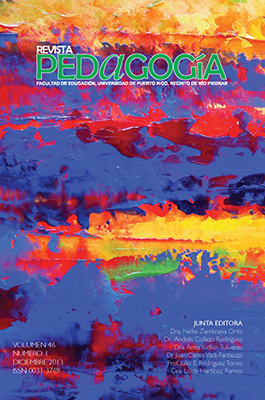Résumé
Los juegos de vídeo y de computadora son un elemento característico de la crianza de las generaciones actuales de estudiantes, y en un creciente cuerpo de literatura se halla constancia de su potencial pedagógico. Partiendo del uso que tres maestros practicantes en Estudios Sociales en la Escuela Secundaria de la Universidad de Puerto Rico hicieran de dos videojuegos populares dentro del curso de Historia General, se auscultó la reacción que esta práctica tuvo entre estudiantes de noveno grado mediante cuestionarios y grupos focales. Un análisis de los datos obtenidos revela varias limitaciones y posibilidades que tienen estos juegos como recursos pedagógicos. Se valora el costo (en tiempo), los dilemas éticos planteados por el contenido violento y los beneficios curriculares de los dos juegos utilizados en el curso. Además, se recomienda que se estudie más a fondo la utilidad de estos juegos como recursos pedagógicos, pues investigaciones sobre este tema pueden impactar las posibilidades de innovaciones curriculares en el futuro.
Cómo citar:
Seale-Collazo, J. (2013). ¿Violencia virtual en el salón? Los videojuegos y la pedagogía lúdica como recursos para la enseñanza de la Historia a nivel secundario. Pedagogía, 46(1), 40-65. Recuperado a partir de https://revistas.upr.edu/index.php/educacion/article/view/16415
Références
Bloor, M., Frankland, J., Thomas, M. y Robson, K. (2001). Focus groups in social research. Thousand Oaks, CA: Sage Publications.
Clark, R. (2010). Assassin‘s Creed 2 shot through the heart. Christ and Pop Culture [website]. Recuperado de http://www.christandpopculture.com/featured/assassins-creed-2-shot-through-the-heart/
Editors. (2010). Cave painting: Video games as art. N+1, 10. Recuperado de http://nplusonemag.com/cave-painting
Entertainment Software Association. (2011). Games: Improving help. Recuperado de http://www.theesa.com/gamesindailylife/health.asp
Gee, J. P. (2007). What video games have to teach us about learning and literacy (2da. ed.). Nueva York: Palgrave MacMillan.
Hartmann, T. & Klimmt, C. (2006). Gender and computer games: Exploring females‘ dislikes. Journal of Computer-Mediated
Communication, 11(4), 910-931. Recuperado de http://jcmc.indiana.edu/vol11/issue4/hartmann.html
Kitzinger, J. (1995). Qualitative research: Introducing focus groups. British Medical Journal, 311, 299-302.
Klopfer, S., Osterweil, S., Groff, J. & Haas, J (2009). Using the technology of today, in the classroom today: The instructional power of digital games-social networking-simulations and how teachers can leverage them. The Education Arcade. Recuperado de http://education.mit.edu/papers/GamesSimsSocNets_EdArcade.pdf
Krueger, R. A. & Casey, M. A. (2008). Focus groups: A practical guide for applied research (3ra. ed.). Thousand Oaks, CA: Sage Publications.
Lucca, N. & Berríos, R. (2009). Investigación cualitativa: fundamentos, diseño y estrategia (2da. ed.). Cataño: Ediciones SM.
Prensky, M. (2001). Digital natives, digital immigrants. On the Horizon, 9(5), 1-6.
Quijano, J. (2008). Interactive narrative in the form of new media: Defining role playing games. Pedagogía, 41, 61-72.
Rosario Luna, R. (sin fecha). Poder: revolución burguesa; revolución socialista; liberación nacional; crisis capitalista. Juego de cartas preparado para uso educativo.
Shaw, P. (2009). Assassin‘s Creed 2: Blending fiction with history. Recuperado de http://www.gamepro.com/article/features/212767/assassins-creed-2-blending-fiction-with-history
Spindler, G. & Spindler, L. (1988). Roger Harker and Schonhausen: From familiar to strange and back again. En G. Spindler (ed.), Doing the ethnography of schooling: Educational anthropology in action. Prospect Heights, IL: Waveland Press.
Squire, K. (2003). Video games in education. International Journal of Intelligent Simulations and Gaming, 2(1), 49-62.
Squire, K. (2005). Changing the game: What happens when video games enter the classroom? Innovate: Journal of Online Education, 1(6).
Squire, K. (2007, Sep.-Oct.). Games, learning and society: Building a field. Educational Technology, pp. 51-54.
Squire, K. (2008). Video game-based learning: An emerging paradigm for instruction. Performance Improvement Quarterly, 21(2), 7-36.
Squire, K. & Barab, S. (2004). Replaying history: Engaging urban underserved students in learning world history through computer simulation games. Proceedings of the 6th International Conference on Learning Sciences (ICLS ‘04), Santa Mónica, CA.
Teachers Curriculum Institute. (1994). History Alive! Engaging all learners in the diverse classroom. Menlo Park, CA: Addison Wesley.
Webb, M. (2009, 3 de noviembre). Morgan Webb interviews Assassin‘s Creed II producer on historical Accuracy [vídeo]. Recuperado de http://www.g4tv.com/thefeed/blog/post/700421/morgan-webbinterviews-assassins-creed-ii-producer-on-historical-accuracy/

Ce travail est disponible sous licence Creative Commons Attribution - Pas d’Utilisation Commerciale 4.0 International.

